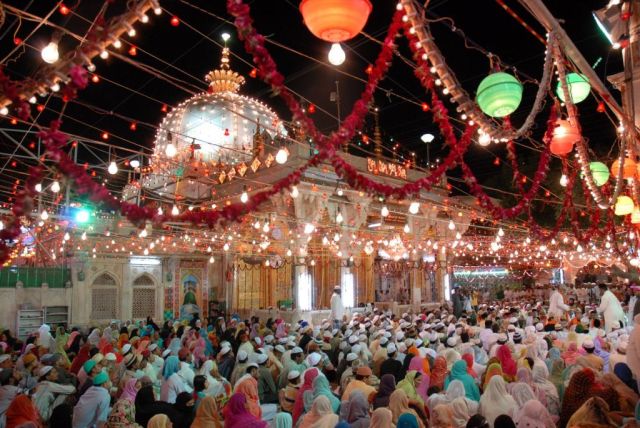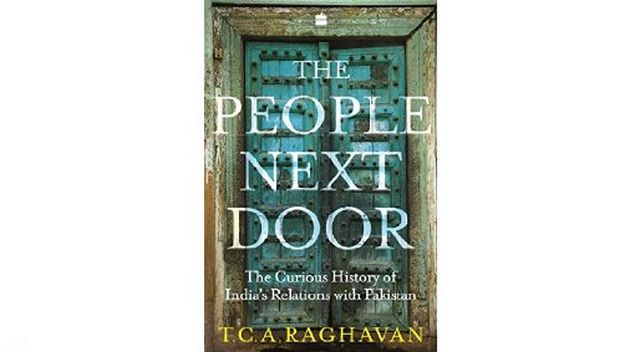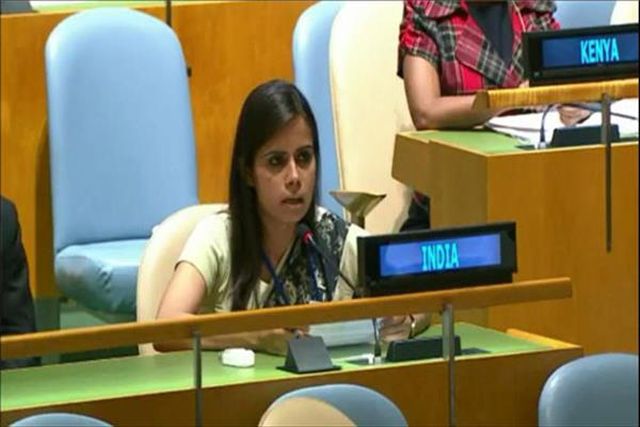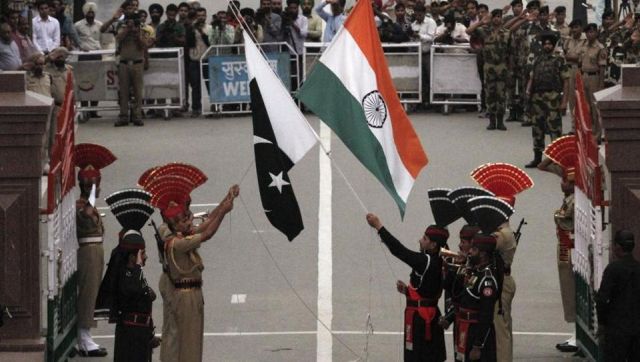
by Editor | May 25, 2021 | News, Politics
 Islamabad : Islamabad said on Monday that New Delhi denied visa to more than 500 pilgrims who were to join the annual Urs celebrations at Ajmer in India this month.
Islamabad : Islamabad said on Monday that New Delhi denied visa to more than 500 pilgrims who were to join the annual Urs celebrations at Ajmer in India this month.
“Pakistan notes with deep disappointment the non-issuance of visas by India for the visit of the 503 Pakistani (pilgrims) to participate in the Urs of Hazrat Khawaja Moinuddin Chishti at Ajmer Sharif on March 19-29,” the Foreign Ministry said in a statement.
The Pakistani pilgrims have been deprived of the opportunity to participate in the gathering, which is of special significance to them, the statement said.
Earlier, 192 Pakistani pilgrims could not take part in the annual gathering of another Sufi saint, Hazrat Khawaja Nizamuddin Aulia, in Delhi in January due to the non-issuance of visas by India, according to the foreign ministry.
—IANS

by Editor | May 25, 2021 | Books
 By Vikas Datta,
By Vikas Datta,
Title: The People Next Door — The Curious History of India-Pakistan Relations; Author: T.C.A. Raghavan; Publisher: HarperCollins ; Pages: 361; Price: Rs 699
Shifting from cordial and promising to suspicious and hostile (and back again), regularly overshadowed by history, ideology and perceptions, prone to public posturing but also quiet, behind-the-scenes pragmatism, Indian-Pakistan relations possess their own unique and complex logic, which even the eminent political scientist Hans Morgenthau would find hard to explain.
And these relations can have wide ramifications and resonances — both in high international politics but also domestic, as we learn in this book. The first was seen during the 1965 war, which also left two Southeast Asian nations engaged in their own spat, or in 1971, when two leading Communist powers virulently assailed each other at the UN Security Council.
A good example of the second was how the decision of Indira Gandhi to accept the mandate against her in the 1977 (post-Emergency) general elections was seen in Pakistan — which had its own share of political upheavals that year. A small aside was Mrs Gandhi’s tart response to a Pakistani dignitary’s invitation to visit — but actually aimed at then Foreign Minister Atal Bihari Vajpayee, who was sitting on the other side.
Beyond these, the Partition, Kashmir, river water sharing, terrorism, the nuclear arms race and many other facets, including cooperation, make India-Pakistan ties cover a large and complex canvas, painted and repainted over for seven decades, leaving those well-versed at one point not as adept later.
But the attempt to decipher it has to be made with the latest effort by former Indian High Commissioner to Pakistan T.C.A. Raghavan, who admits it is not a very easy task since “every facet of the relationship has over the decades been scrutinised and commented upon in detail…” and public knowledge is “considerable”.
Asking “how much more can possibly be written about a relationship which has been bad in the most conceivable ways” since the countries came into being, Raghavan, who had two tours of duty in Pakistan, notes that his own experiences “had been marked by a near-constant discovery of something new about the past”.
These, he clarifies, are not “new” facts but a new look at events and their connections, which gives a more nuanced and more rounded perspective to the course of ties to “impart a fuller sense of how and why things developed as they did”.
This approach and its considerable scholarship, manifested in both wide ranging and absorbing minutiae, is what makes the book a usefully incisive and informative addition to the considerable literature, of all kinds and approaches, already available.
Raghavan, who begins with showing how issues that would bedevil relations down the years came within roughly a year of Independence/Partition, also dwells here on some lesser-known/understood matters such as the first water crisis and the issue of Kalat (expanding to entire Balochistan down the ages).
Alongside, there is the curious case of Rahmat Ali, who coined the name “Pakistan” but found no place in it, three case studies of “Muslims who would, in the the normal course, have been the pillars of the new Pakistan but moved in the opposite direction”, and largely unknown cases of cooperation between the two nations even as conflict was raging in Kashmir.
And then there are nuggets of interesting trivia like a master criminal who fled to Pakistan and whose extradition India unsuccessfully demanded (hint: it was not Dawood Ibrahim)
Raghavan, who follows a chronological approach, also stresses that instead of trying to be “exhaustive”, he aims at bringing a “fuller flavour” in a “more subjective and selective view of both well- and lesser-known incidents and individuals in a broad context of the principal ups and downs of the relationship”.
And towards this, he draws upon not only diplomats and politicians, but also journalists, activists and others to provide a new perspective on prominent milestones, but also the promise in the late 1950s-60s, in the short Rajiv Gandhi-Benazir Bhutto era, the early Musharraf years, et al.
Even those who think they know all, will find some new perspective in a book which, the author notes, deals with “history”, not “policy”.
Even as he confesses to an Indian perspective of a “divisive and deeply contested past and present” – Raghavan showcases how, here, it is not what happened, but what is perceived to have happened — and remembered — that is the key.
It is this legacy we need to understand and overcome for a better future.
(Vikas Datta can be contacted at vikas.d@ians.in)
—IANS

by Editor | May 25, 2021 | News, Politics

Eenam Gambhir
By Arul Louis,
United Nations : In a sharp escalation of its attack, India slammed Pakistan at the UN for its support to terrorism, calling it “terroristan”.
“In its short history, Pakistan has become a geography synonymous with terror,” Eenam Gambhir, First Secretary in India’s Permanent Mission to the UN, said on Thursday exercising India’s right of reply after Pakistan Prime Minister Shahid Abbasi’s virulent attack that “the struggle” of the people in Kashmir was being “brutally suppressed by India”.
Gambhir, who stole the show last year when she verbally pummelled former Pakistan Prime Minister Nawaz Sharif and delivered the memorable line: “The land of Taxila, one of the greatest learning centres of ancient times, is now host to the Ivy League of terrorism”, packed equally powerful punches against Abbasi this year.
Pakistan’s “contribution to the globalisation of terror is unparalleled”, she declared.
“The quest for land of pure has actually produced a ‘land of pure terror’.
“Pakistan is now ‘Terroristan’ with a flourishing industry producing and exporting global terrorism,” Gambhir added.
In his speech, Abbasi warned of the possibility of a “dangerous escalation” in the subcontinent and clamoured for intervention by the global organisation.
Accusing New Delhi of frequently violating the ceasefire along the Line of Control (LoC) in Kashmir, he said that “if India does venture across the LoC, or acts upon its doctrine of ‘limited’ war against Pakistan, it will evoke a strong and matching response”.
“The international community must act decisively to prevent the situation from a dangerous escalation,” he said.
Abbasi also admitted that Pakistan’s nuclear arsenal is directed against India.
“Confronted by a hostile and increasingly militarized neighbour, Pakistan has been obliged to maintain the capability for credible deterrence,” he said. “Our strategic assets are vital to deter oft-threatened aggression.”
Abbasi spent almost a third of his General Assembly address of about 12 minutes attacking India.
Abassi also accused India of war crimes over the use of pellet guns by law enforcement personnel and warned of a “dangerous escalation” on the subcontinent.
Lampooning Abbasi’s claim of fighting terrorism, she said: “This is a country whose counter-terrorism policy is to mainstream and upstream terrorism by either providing safe haven to global terror leaders in it military towns or protecting them with political careers.”
“It is extraordinary that the state which protected (former Al Qaeda leader) Osama bin Laden and sheltered Mullah Omar should have the gumption to play the victim.
“By now all Pakistan’s neighbours are painfully aware of these tactics of creating narratives based on distortions, deception and deceit,” the diplomat said.
She also said that the current state of Pakistan could be gauged from the fact that Hafiz Saeed, leader of the UN-designated terrorist outfit Lashkar-e-Taiba, was now seeking to be legitimised as a leader of a political party.
Stating that nothing can justify Pakistan’s avaricious efforts to covet territories of its neighbours, Gambhir said: “In so far as India is concerned, Pakistan must understand that the state of Jammu and Kashmir is and will always remain an integral part of India.
“However much it scales up cross-border terrorism, it will never succeed in undermining India’s territorial integrity.”
Ridiculing Pakistan for its complaints about the consequences it faced for its counter-terrorism efforts, she said: “Having diverted billions of dollars in international development aid towards creating a dangerous infrastructure of terror on its own territory Pakistan is now speaking of the high cost of its terror industry.
“The polluter in this case is paying the price,” she added.
Gambhir got the backing of an Afghan diplomat, who spoke after her, also exercising his right of reply to Abbasi’s allegations about terrorism coming to Islamabad from Kabul.
The Afghan diplomat asked where did Osama, Mullah Omar and his successor Mullah Akhtar Mansoor die, and answered they were locations in Pakistan.
“That was the country from which more than 20 international terrorist organisations came to Afghanistan and even Abbasi had admitted that those who carried out the May 31 bomb attack in Kabul that killed more than 150 people may have come from his country,” he added.
None of the 112 other countries that have spoken so far in the annual high-level General Assembly debate has even mentioned the Kashmir issue, and last year none other than Pakistan did during the entire session.
Earlier on Thursday, Abbasi met Secretary-General Antonio Guterres. Pakistani media reported that he handed over to Guterres a dossier of “Indian atrocities in Kashmir”.
—IANS

by Editor | May 25, 2021 | News, Politics
 By Arul Louis,
By Arul Louis,
United Nations : Cross-border terrorism from Pakistan is at the root of the current situation in Kashmir and it has also victimised the people of the part of the state occupied by Pakistan, India said on Tuesday dismissing Islamabad’s attempts to raise the Kashmir issue at the UN Human Rights Council (UNHRC) meeting in Geneva.
“Jammu and Kashmir is an integral and inseparable part of India and will always remain so” despite Pakistan’s use of “terrorism as a state policy” for territorial aquisition, Sumit Seth, a First Secretary in India’s UN Mission in Geneva, said on Tuesday while exercising the right of reply to Pakistan’s allegations about India.
“The present situation in the Indian State of Jammu and Kashmir is the direct result of sustained cross-border terrorism emanating from Pakistan,” he said.
“The high number of casualties sustained by Indian security forces is a reflection of the tremendous amount of restraint displayed by them under these difficult circumstances.”
Pakistan’s Permanent Representative in Geneva, Farukh Amil, raked up the Kashmir issue while taking exception to UN Human Right Commissioner Zeid Ra’ad al-Hussein criticising India and Pakistan on Monday for not allowing a fact-finding team to the Indian state and the part occupied by Pakistan.
Amil asserted that reports of atrocities and human rights abuses emanated from the Indian state and not from the part of it occupied by his country and, therefore, questioned al-Hussein equating the two countries.
Amil alleged that al-Hussein’s statement was not based on facts.
Seth in his rejoinder said that India had “a robust institutional framework to ensure adherence to the rule of law and respect for fundamental rights of the people in Kashmir” built on an independent judiciary, the National Human Rights Commission, vibrant civil society and free and vocal media.
The people of the Indian state have regularly exercised their democratic rights, Seth added.
“In contrast, the people of Pakistan as well as Pakistan Occupied Kashmir have become victims of sectarian conflict, terrorism and severe economic hardship due to Pakistan’s authoritarian and discriminatory policies in complete disregard of human rights,” Seth said.
When the floor was opened at the council meeting on Tuesday to NGOs and civil society organisations, a motley group of them let loose a volley of propaganda against India.
According to a summary of the proceedings prepared by the HRC, some of these centred on India and Pakistan not allowing a fact-finding mission to the Indian state and the Pakistan-occupied portion of it, while others singled out India.
The Association for the Protection of Women and Children’s Rights said there was a need to focus on the situation in territories under foreign occupation and lumping Kashmir in that category it asserted that human rights violations had increased there because the HRC mission was not allowed in.
Commission Africaine des Promoteurs de la Sante et des Droits de l’Homme said that terrorism and systematic human rights violations in Kashmir required more attention by the High Commissioner and that unprovoked heavy shelling had resulted in daily deaths of civilians.
A group called Liberation alleged that India was experiencing increasing religious intolerance under the pretext of the protection of the “holy cow”.
Indigenous People of Africa Coordinating Committee claimed that homes of non-Hindu minorities had been systematically destroyed and their products were regularly boycotted.
Centre for Organisation Research and Education said that members of scheduled tribes and castes were victims of rape and honour killings.
A group called Tamil Uzhagam said that human rights activists in Tamil Nadu needed the UNHRC’s protection.
(Arul Louis can be reached at arul.l@ians.in)
—IANS

by Editor | May 25, 2021 | Corporate, Corporate Governance, News, Politics
 By Mayabhushan Nagvenkar,
By Mayabhushan Nagvenkar,
Panaji : Until some months ago, as Raksha Mantri, Manohar Parrikar, with his trademark fidgety eloquence, could explain the flaws in the LCA Tejas or confidently hold fort on the now-fabled surgical strikes against Pakistan.
However, Parrikar appears to have re-adapted to his role as Chief Minister of India’s smallest state, Goa, and in the course of his relatively subdued campaign for the August 23 Panaji by-polls, rising tomato prices appear to have replaced his discourse on the Tejas indigenous light combat aircraft (LCA).
And in place of the gung-ho surgical strikes’ narrative, the four-time Chief Minister now readily offers tips from his own experience to women’s self-help groups on how to hammer papad dough into soft patties to further their business.
Contesting a by-poll necessitated by his hasty return to state politics in March and subsequent resignation of Panaji BJP MLA Sidhath Kuncolienkar, Parrikar, a five-term Panaji MLA, is anxiously reaching out to his constituents in the state capital, whom he was forced to leave mid-way, when he was elevated as Defence Minister in the Prime Minister Narendra Modi-led cabinet in November 2014.
Earlier this week, after completing more than 100 informal meetings with voters in the homes and parks of residential colonies, Parrikar was in his rustic element, as he addressed a group of women voters, several of whom run self-help groups.
And, as is Parrikar’s won’t, he offered a quick solution to the cash crunch faced by housewives, when faced with inflation, especially the rising prices of tomatoes.
Parrikar first explained why the prices of tomatoes shoot up in the monsoon, saying the fleshy essential vegetable rots easily and because the state does not produce the crop, importing tomatoes invariably means a bigger cost.
But he offered the fifty-odd visibly impressed audience a simple solution to beat tomato prices, which after scaling a high of Rs 100 per kg, have now stablised at Rs 45.
“In reality there is a simple way (to avoid tomatoes). On a day that you do not have tomatoes at home, use more onions,” Parrikar said.
The Indian Institute of Technology-Bombay alumnus further explained that no matter how much inflation shoots, the eventual setback to a household’s budget is in the range of Rs 200 to Rs 250.
“When I say tomatoes, no one buys 10 kg of tomatoes for consumption. For household use, people normally buy one kg, half a kg or 400 gm, depending on the size of the family,” Parrikar said.
“People buy more onions. From two kg to five kg. Again that depends on the (size of the) family. Today’s families can utilise two kg onions for almost a month. Why am I saying this? When I calculated all details of inflation, I realised that, however much inflation rises, the difference (to the household’s budget) is Rs 200 to Rs 250,” he said, adding that his government had, in the past, offered schemes like the Griha Adhar Yojana to housewives and more such measures could be on the anvil in the future.
Parrikar, who did his bachelors in metallurgical engineering, also dipped into his childhood to explain to representatives of women’s self-help groups at the BJP state party office on Wednesday about the significance of kneading the perfect dough to manufacture quality papads, which he said are a good financial incentive for small collectives.
“I am telling you papad-making is in demand. You don’t have to roll a papad nowadays. All that matters is your skill at hammering (the dough) and adding the right amount of spices. That is all you need to know, the rest of the work can be done by the machine. When I was small, I also hammered dough,” Parrikar said.
Another business idea Parrikar offered the self-help groups was making of “dronns”.
No, he wasn’t referring to the hi-tech, armed, unmanned aerial vehicles he had lined up to procure during his August 2016 visit to the US as Defence Minister, but to cups made of compacted, dry leaves referred to as dronns in Konkani, Goa’s native tongue.
“Simple dronns are in demand. All you need to do is press them on a machine,” Parrikar said.
(Mayabhushan Nagvenkar can be contacted at mayabhushan.n@ians.in)
—IANS

 Islamabad : Islamabad said on Monday that New Delhi denied visa to more than 500 pilgrims who were to join the annual Urs celebrations at Ajmer in India this month.
Islamabad : Islamabad said on Monday that New Delhi denied visa to more than 500 pilgrims who were to join the annual Urs celebrations at Ajmer in India this month.



